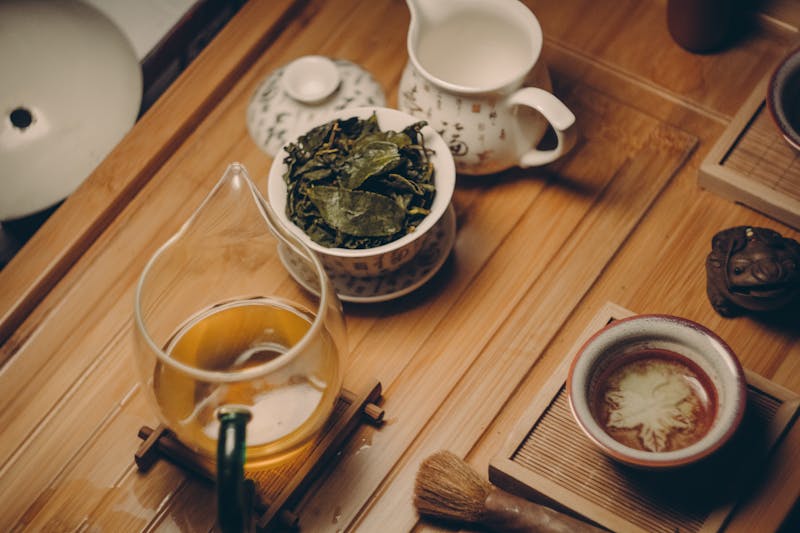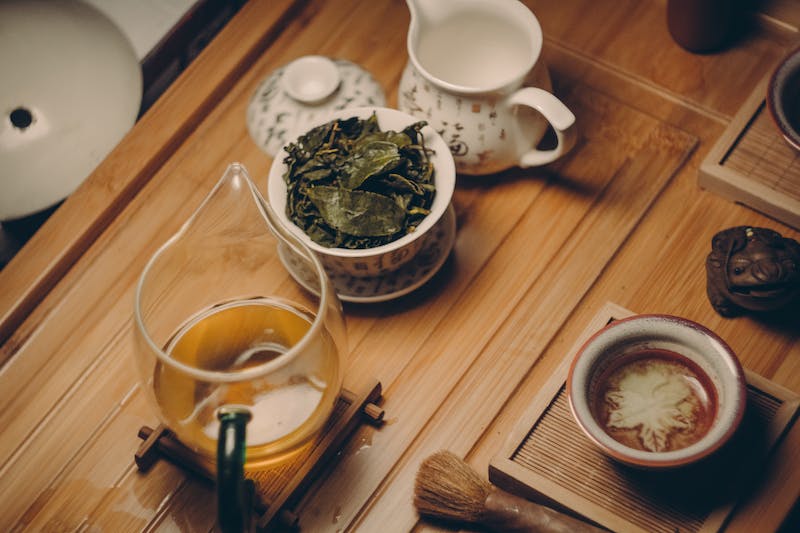Green tea boasts a rich history dating back over 4,000 years to ancient China, making it one of the world’s oldest beverages. According to legend, it was discovered accidentally when tea leaves blew into Emperor Shen Nong’s boiling water, resulting in a delightful brew. Initially prized for its medicinal properties, green tea eventually gained popularity as a beverage of choice among Chinese scholars and nobility. It spread to other parts of Asia, becoming integral to Japanese and Korean cultures. Over time, green tea’s reputation as a health elixir and its distinct flavors led to its global recognition and widespread consumption.
Today, green tea is a popular beverage around the world, known for its health benefits and calming effects. But is there caffeine in green tea? Well, the simple answer is… yes. Join us as we unravel the enigma of caffeine in green tea and discover what makes this beverage a choice for both enthusiasts and those seeking a gentler source of energy.

Is There Caffeine in Green Tea?
Green tea contains caffeine, but the amount present varies depending on several factors such as the type of green tea, the brewing time, and the temperature of the water used. So, how much caffeine in a cup of tea? On average, a cup of green tea (240 ml) contains 25-35 mg of caffeine.
Factors That Affect the Amount of Caffeine in Green Tea
- Type of Green Tea: The caffeine content in green tea depends on the variety of tea leaves used. For example, matcha green tea, which is made from finely ground tea leaves, contains higher levels of caffeine than regular green tea.
- Brewing Time: The longer you steep your green tea, the more caffeine it will contain. Steeping green tea for 3-5 minutes can result in higher caffeine levels.
- Water Temperature: Using hotter water increases the caffeine levels in green tea.
benefits of caffeine in green tea
Caffeine is a natural stimulant that affects the central nervous system. It can improve mental alertness, concentration, and mood. The effects of caffeine in green tea are similar to the effects of caffeine in other beverages. However, there are some differences. For example, the caffeine in green tea is released more slowly into the bloodstream, which results in a more gradual and sustained increase in energy levels.
A 2020 study published in the journal “Nutrients” found that caffeine in green tea can improve cognitive function and alertness. The study concluded that people who consumed caffeine from green tea performed better on tests of memory, attention, and reaction time than people who consumed caffeine from other sources, such as coffee. In fact, green tea contains an amino acid called L-theanine. L-theanine has been shown to have calming and relaxing effects. This is why many people find that green tea gives them a more focused and energetic feeling, without the jitters and anxiety that can sometimes be associated with coffee.
Additionally, caffeine, when combined with the antioxidants and polyphenols present in green tea, may also contribute to improved metabolism and fat oxidation, potentially supporting weight management efforts. Moreover, it has been linked to potential cardiovascular benefits, including improved blood flow and reduced risk of certain heart-related conditions.
Caffeine in Green Tea vs. Other Beverages
Green tea contains less caffeine than other caffeinated beverages, such as coffee, black tea, and energy drinks. A cup of green tea contains about 30-50 milligrams of caffeine, while a cup of coffee contains about 95-200 milligrams and an energy drink contains about 150-300 milligrams.
Here is a table comparing the caffeine content of different beverages:
Caffeine content (mg per cup) |
- Green tea | 30-50 |
- Black tea | 47-90 |
- Coffee | 95-200 |
- Espresso | 63 |
- Energy drinks | 150-300 |
- Cola | 35-45 |
- Decaffeinated coffee | 2-7 |
Caffeine is a commonly used stimulant, and when consumed within recommended guidelines, it is generally regarded as very safe.
If you are concerned about the caffeine content of green tea, you can choose decaffeinated green tea or drink smaller portions of regular green tea. You can also try drinking green tea earlier in the day to avoid disrupting your sleep.
How Much Caffeine Should You Have In a Day?
Many individuals eagerly seek their morning caffeine fix upon waking, and the common “midday slump” often prompts a desire for an afternoon caffeine pick-me-up from the nearest café. For most people, caffeine can play a beneficial role in a healthy diet.
The FDA recommends that healthy adults consume no more than 400 milligrams of caffeine per day. This is about the amount of caffeine in four cups of brewed coffee, 10 cans of cola, or two “energy shot” drinks. However, the amount of caffeine that is safe for you to consume may vary depending on your individual sensitivity to caffeine and your overall health. Some people may experience negative side effects from caffeine, such as anxiety, insomnia, and headaches, even if they consume less than 400 milligrams per day.
If you are pregnant or breastfeeding, it is important to limit your caffeine intake to 200 milligrams per day or less. This is about the amount of caffeine in one cup of brewed coffee or two cans of cola.
FAQs
- Is green tea healthier than coffee? Both green tea and coffee have health benefits and drawbacks. Green tea contains antioxidants that can reduce the risk of chronic diseases, whereas coffee has been linked to improved mental function and reduced risk of Alzheimer’s and Parkinson’s disease.
- Does decaf green tea contain caffeine? Decaf green tea still contains trace amounts of caffeine, but the levels are significantly lower than regular green tea.
- How much caffeine is safe to consume in a day? The recommended daily limit for caffeine is 400 mg per day, which is equivalent to 4 cups of green tea.
- Can green tea help you lose weight? Green tea has been shown to boost metabolism and aid in weight loss when combined with a healthy diet and exercise.
- Can children drink green tea? Children should avoid consuming excessive amounts of caffeine. It is recommended that children under the age of 12 avoid drinking green tea altogether.
Final Takeaway
Green tea contains caffeine, but in lower amounts compared to other caffeinated beverages. The amount of caffeine present in green tea depends on several factors such as the type of tea used, brewing time, and water temperature. While caffeine has its benefits, it is important to consume it in moderation to avoid adverse effects. If you are looking for a caffeine-free alternative, herbal teas or fresh juices can be a good option. Overall, green tea is a healthy beverage that can provide numerous health benefits when consumed as part of a balanced diet and lifestyle.







